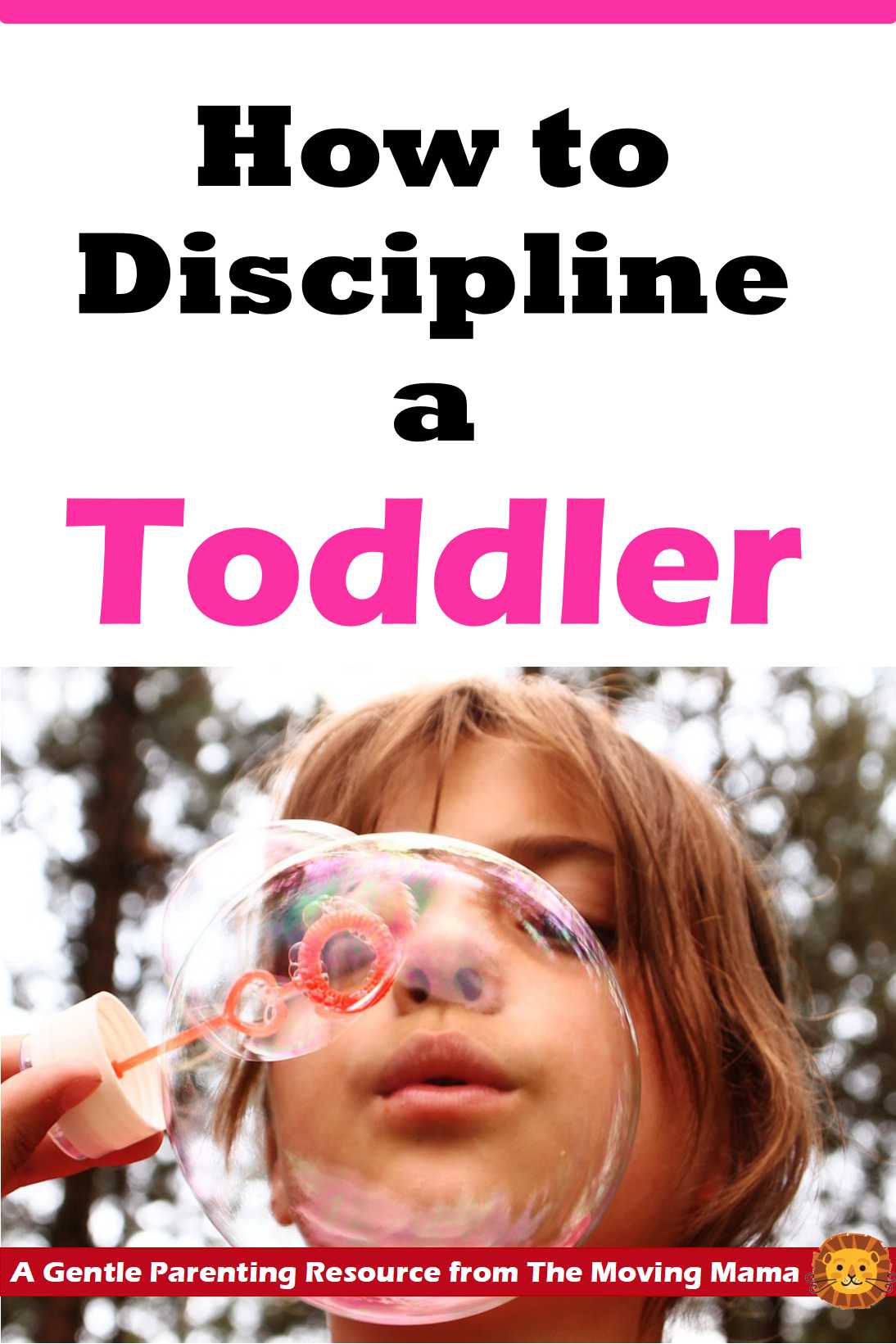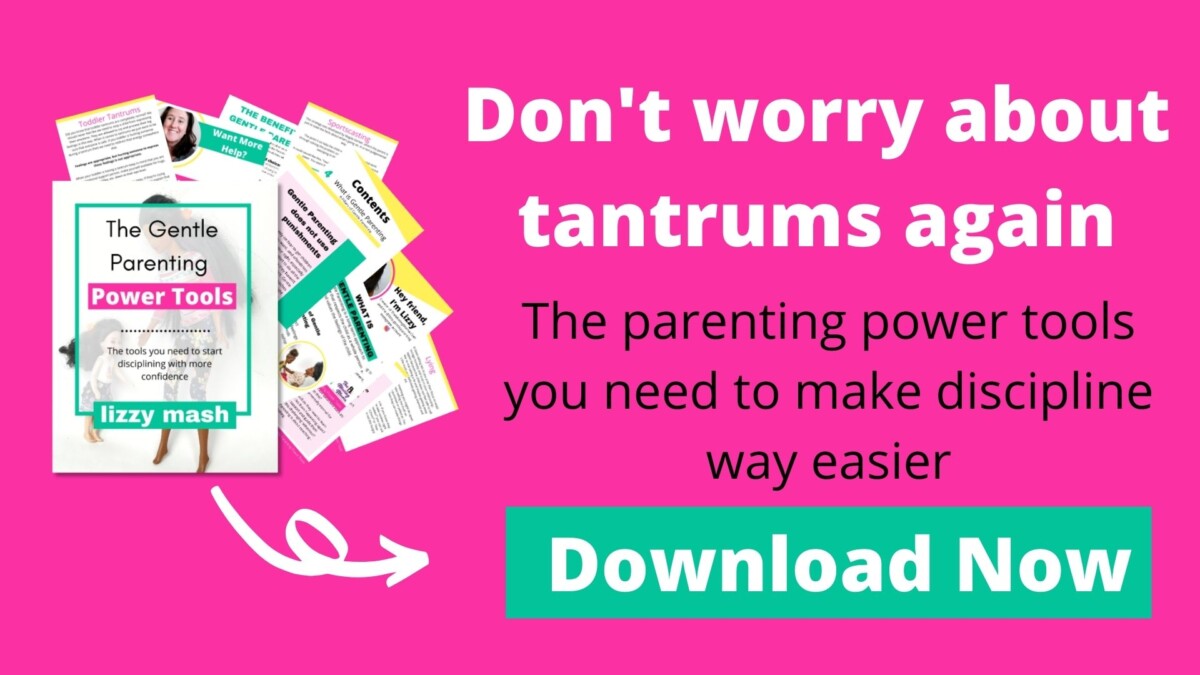If you have a toddler, you are probably very aware of that fact that toddlers have a hard time controlling their emotions, they can be like a rollercoaster of emotions at times and they struggle to control their actions as a reaction to those emotions. If you’re dealing with tantrums, hitting or biting you might be wondering how to discipline a toddler.
There are a lot of different strategies you can use to discipline a toddler, and it’s good to keep those in your toolbelt so you can use the strategy that is best for that particular scenario.
However, there are a few fundamental items we should always keep in mind if we want to be able to successfully discipline our toddlers, and most of it has to do with ourselves first before we focus on our children.

(This post might contain affiliate links, which means if you happen to buy a product I love then I may get a commission – at no extra cost to you! For all the Ts and Cs go here.)
Effectively Disciplining a Toddler Takes A Calm Mom
As the adult in the relationship, it’s important that when tantrums break out you are able to keep your cool. If you are able to model patience your child will learn from that, but having an adult sized tantrum on top of your child’s will only make matters worse.
But it is really hard to have patience and be a calm mom.
There are things that irritate us, and we get frustrated when our child is making us late, or breaking things we worked hard to buy. Mom anger is really common and not easy to combat. I recently read how anger has to do with control. We get angry when we feel like we can’t control the things around us. This is definitely how young children feel at times, but also moms.
When our child is doing the opposite of what we want and we feel like we can’t get them to stop we feel like we have lost control. This makes us frustrated and angry, and we start to lose our cool.
In these moments, try to focus on the things you CAN control to help yourself calm down.
- I can tap my toes 10 times
- I can hold my hands together
- I can take 5 deep breaths
Try to focus on something you can control to “trick” your brain, it will help you to feel less frustrated that you can’t control your child.
To become a patient and calm mother might take time if it’s something you struggle with, but overtime you can start to see huge changes. Try to make time for yourself whenever possible so you can get the rest you need. Being crabby when you’re tired or hungry isn’t uncommon for moms. Try to be aware of the things that make you lose your patience so you can try to prevent them in the future.
Try to see things from your child’s point of view
In this parenting journey it is really easy to lose sight of the big picture. When we are feeling frustrated with our child’s behaviour and they way it affects us the focus from helping them learn to do what’s right can turn into it being all about us.
Try to see things from your child’s point of view so you can develop more patience. Try to understand why they are doing something a certain way, and why they might be upset. If you can find a way to relate to their desires and feelings it will be easier to correct them.
You might feel frustrated with how they execute their desires and feelings, but knowing the “WHY” behind it will help a lot. You will be more empathetic and when it comes time to correct them it will be easier for your to approach them from a place of love and understanding.
Related:6 Steps to Stop Being an Angry Mom
Prioritize a Trusting Relationship
One of the most important part of successful discipline is establishing a trusting relationship with our child, and this is actually one of my 6 pillars of Gentle Parenting.
When we prioritize making our relationship with our child one that is full of trust it makes it easier for our child to receive correction from us. If we are consistent and gentle they will not be afraid when it is time for correction and they will be more willing to listen.
Punishments break trust
By using physical punishments, timeouts, guilt/shaming behaviour or name calling we actually break that trust.
Think about it this way, when a child is already hurting (for example, during a tantrum) and we cause them more pain it makes them harder to trust us in the future.
Physical punishments cause physical pain of course, but timeouts, guilt/shaming the behaviour or name calling causes emotional pain. It is good for toddlers to face the natural consequences of their behaviour, and that can be painful, but when we intentionally make it worse that pain is then coming from someone they trust rather than directly from their actions.
Timeouts cause emotional pain because it’s often a shame based experience and it separates the toddler from their parent, who they are actually looking to receive comfort from during these highly emotional moments.
Daily connection does a long way for toddler discipline
Try to intentionally add more daily connection to your relationship with your toddler. Physical touch, listening closely to what they are saying, talking to them at their eye level; all these things can help develop a more meaningful relationship.
This will show your toddler that you really care about them and that they are safe with you. I like to think of my relationship with my toddler as a sanctuary. I want her to feel safe with me and never afraid. We work on this during the regular day to day, but in those moments when we does something she really shouldn’t, I don’t send her away but I offer my comfort with correction.
She can truly hear me because she feels comforted.
Once you have prioritized a trusting relationship you will find it much easier to actually discipline your toddler.
How not to discipline a toddler
Before we get into it I just want to address a few ways that I don’t endorse for disciplining a toddler. These might be common strategies for some, but since I promote Gentle Parenting and have worked with children for many years I can see that long term these strategies don’t work.
- Timeouts (They make toddlers feel they have no control and often makes them more upset. It also separates them from the person they need comfort from and can cause a lot of shame.)
- Spanking/hand smacking (Long term this doesn’t motivate children to do what’s right because it’s good but just to avoid punishment out of fear.)
- Lecturing (It is better to be straight and to the point so it is very clear to your child what to take from the correction. Lecturing can also lead to shaming the child for their behaviour which breaks their self-esteem. We would much rather empower our child to do the right thing.)
- Name Calling/Guilting (If a parent says things like, “How could you be so stupid?” or “You’re driving me crazy” it will make the child feel worse and not better. Shame based discipline does not build up strong future adults.)
- Yelling (Children actually learn to tune out yelling, plus it hurts to be yelled at. In the long run yelling usually just turns into more yelling and more yelling because it never seems to work.)
How to Discipline a Toddler
Now it is time to actually discipline your toddler. I will be listing for you some specific strategies you can use when it comes to disciplining your toddler, and it’s up to you to know how to discipline your own toddler based on their age, the situation and what you know works best for them.
If you try a strategy and it doesn’t work, keep in mind that some things just take time. Sometimes toddlers just need to get used to how you discipline, if you remain consistent they will know what to expect in those challenging moments and it will make it easier for them.
For example, if you always respond the exact same way when your toddler is having a tantrum, they will know the “steps” taken during the tantrum. They will already know you won’t let them hurt anyone, that you are there for them if they need comfort, and that when they are done you are ready to continue to the next activity. If you stay consistent with this then this “routine” will be predictable to them and you might find the tantrums get shorter and short.
For more on tantrums read this: Toddler Tantrums (The Full Effective Guide)
1. Redirect
Redirecting your child as a form of discipline is simple and essential, especially when they are still very young. If your child is doing something you don’t want them to be doing just redirect them to something they can do.
You don’t want your toddler playing with your phone? Hand them a toy instead.
Redirection, it’s that easy.
2. Identify their feelings
During a tantrum or other highly emotional moment don’t be afraid to validate their feelings. Validating their feelings doesn’t mean you’re approving the ways they chose to express those feelings (ex. hitting) but it will help your child to calm down know that you are on their side.
Say things like, “You are really frustrated that it’s time to go.”
3. Say, “You wanted….”
When your toddler is upset that they can’t get what they wanted try saying, “You wanted ____.” It helps your child to feel understood which can help them to calm down.
4. Clearly state why a behaviour is not ok
Say things such as, “Hitting hurts people” or “Climbing on the table is dangerous.”
Stick to simple phrases to clearly address the behaviour. By keeping it simple it will be easier for your toddler to remember.
5. Warn your child as you gently remove them from the situation
If they are about to get hurt or about to hurt someone else you can say, “You’re not being safe and I need to pick you up now to keep you safe.” Then gently lift them up but try to avoid abruptly removing them from the situation because that could startle them and make the more frustrated.
By giving them a warning you are respecting them while also keeping everyone safe.
6. Follow through with warnings
If you choose to say, “Get down,” or “I won’t let you climb up there,” or “If you climb on the chair I’m going to have to put the baby gate back up to keep you out of the kitchen,” make sure you follow through with those things
If anything you say to your child sounds like an ultimatum make sure you follow through with it, otherwise your toddler will get used to being able to do the opposite of what you say or that you don’t correct them.
Consistency is really important when it comes to toddler discipline. If you find it hard to follow through though, maybe try rephrasing how you talk to your toddler. It’s hard sometimes to follow through with what we say, sometimes it’s better to say something like, “Wow, be careful there, you know it’s not safe to climb the chair.” It gives the child a chance to come down and a moment for you to get ready to go and help them, but if you say, “Get down right this instance,” then if they don’t get down you will need to get up and enforce what you said.
7. Offer better alternatives to their behaviour
If you are clearly stating to your toddler why a certain behaviour wasn’t ok, you should also let them know what they could do instead. When your toddler is screeching for more food you can say something like, “Wow, that is too loud, next time say, ‘More please.’”
By letting them know what to do next time you are empowering them to easily make the right choices.
8. Remember that “No” is a command, not an instruction
“No” and “Stop” are commands, but they don’t have any teaching attached to them. Try to remember to include instruction/teaching in your correction with your child. In the end we want children who choose to cooperate and who can make decisions for themselves. Sometimes this means shifting our expectations. Rather than expecting immediate obedience from your child think about ways to develop willing cooperation.
9. Allow emotions to be processed before talking
The way our brains work when we are very emotional it’s hard to think rationally. When children are very upset about something they just about lose control over the left side of their brain which is the rational, reasoning side. If your child is having a full-blown tantrum because you cut their sandwich in half logic such as, “It tastes the same,” won’t be as effective as you would like.
Allow your child to process those emotions and give comfort as needed. Once they have calmed down and gained control it will be much easier for them to hear what you have to say about the situation.
10. Be a good role model
Show your child the right way to do things and the right way to respond in frustrated situations. Show them how you take 5 deep breaths when you’re frustrated or how you say, “Excuse me” if someone is in your way.
Toddlers learn so much about the world around them by watching what we do.
11. Move on after the fact
After correcting your toddler allow the day to move on, keep it short and sweet and don’t dwell on their behaviour. This helps your toddler see the exact point you were trying to make and avoids making them feel ashamed as a person for what they did.
Learn why your toddler behaves a certain way
In those moments that you are disciplining your toddler, ask yourself why they are doing that and how you could have prevented it. Maybe they are hungry or tired, how could you have avoided that? How could you have helped them through it?
Or maybe your house is set up in a way that they are surrounded by temptations they just can’t control themselves around. It might be worth it to put a baby gate up at the kitchen rather than constantly having to correct your child who wants to touch so many things they aren’t allowed to touch. If you are feeling frustrated and overwhelmed because the behaviour is always repeating itself it might be easier to just change the environment to make it impossible for your toddler to do that thing. Once they are older they will make more self control and it will be easier for you to teach them not to turn the knobs on the stove or open the cupboard under the sink.
Oftentimes, prevention is a lot easier than correction. We often refer to this as setting limits or boundaries.
Related: 10 Easy Ways to Prevent Toddlers From Running Away
Don’t be afraid to start from scratch
When it comes to knowing how to discipline a toddler in a way that is effective it can take some trial and error and sometimes we feel like we need to start all over again.
Sometimes we just have to start a new day and forget the mistakes we made yesterday when we raised our voice or left them in the highchair screaming. Forgive yourself and know this, toddlers move on quickly. If you want to try gentler and more effective ways to discipline don’t let the bad days hold you down.
Work on your patience, prioritize your relationship and stay consistent. It might not all come together overnight, but you will see changes over time.
If you want to add more positive discipline to your life you should download the Gentle Parenting Power Tools and you will learn how to weed out the bad discipline tips and focus on what works.
Read More About Gentle Parenting for Toddlers
How to Create a Toddler Bedtime Routine
Toddler Biting: Gentle strategies to control it
2 Year Old Tantrums: The 1 Tip You Can’t Miss



My one year granddaughter is so busy in to everything.How do I talk to her and set boundaries when she dont understanding